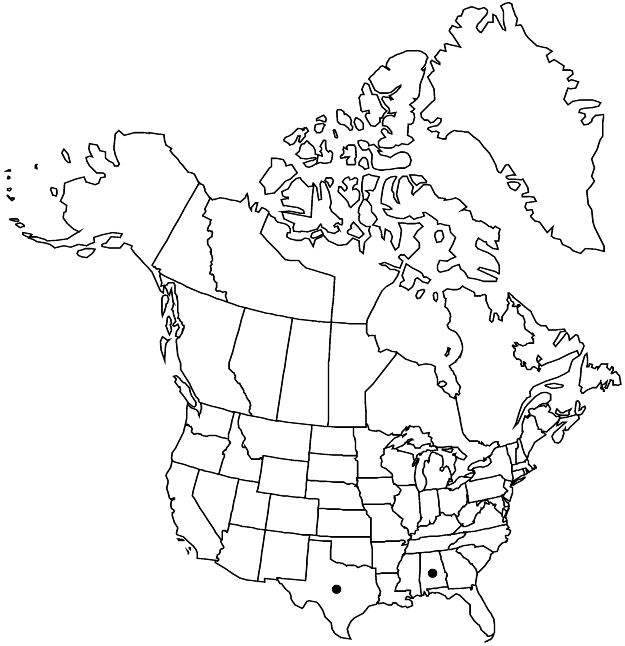Difference between revisions of "Croton alabamensis"
Fl. South. U.S. ed. 2, 648. 1883.
FNA>Volume Importer |
FNA>Volume Importer |
||
| Line 25: | Line 25: | ||
|distribution=sc United States. | |distribution=sc United States. | ||
|discussion=<p>Varieties 2 (2 in the flora).</p><!-- | |discussion=<p>Varieties 2 (2 in the flora).</p><!-- | ||
| − | --><p>B. W. van Ee et al. (2006) examined populations of Croton alabamensis using DNA sequence and AFLP data, and their results supported the recognition of two varieties and an isolated position in the genus. Buds develop in the summer and fall for the following spring's flowers.</p> | + | --><p>B. W. van Ee et al. (2006) examined populations of <i>Croton alabamensis</i> using DNA sequence and AFLP data, and their results supported the recognition of two varieties and an isolated position in the genus. Buds develop in the summer and fall for the following spring's flowers.</p> |
|tables= | |tables= | ||
|references= | |references= | ||
| Line 60: | Line 60: | ||
|publication year=1883 | |publication year=1883 | ||
|special status=Endemic | |special status=Endemic | ||
| − | |source xml=https://jpend@bitbucket.org/aafc-mbb/fna-data-curation.git/src/ | + | |source xml=https://jpend@bitbucket.org/aafc-mbb/fna-data-curation.git/src/8f726806613d60c220dc4493de13607dd3150896/coarse_grained_fna_xml/V12/V12_937.xml |
|genus=Croton | |genus=Croton | ||
|species=Croton alabamensis | |species=Croton alabamensis | ||
Revision as of 15:51, 18 September 2019
Shrubs, 5–35 dm, monoecious. Stems usually well branched distally, lepidote. Leaves clustered at branch tips; stipules absent; petiole 0.6–2 cm, glands absent at apex; blade elliptic, ovate, or oblong, 3–10 × 1.5–5 cm, base rounded to obtuse, margins entire, sometimes ± undulate, apex acute, rounded, or emarginate, abaxial surface silvery or coppery, densely lepidote, adaxial surface green, sparsely lepidote. Inflorescences bisexual or unisexual, racemes, 2–4.5 cm, staminate flowers 0–15, pistillate flowers 0–10. Pedicels: staminate 2.2–4 mm, pistillate 2.2–7.5 mm (7–11 mm in fruit). Staminate flowers: sepals 5, 1.1–2.9 mm, abaxial surface lepidote; petals 5, oblong-ovate, 2–3.1 mm, abaxial surface glabrous except margins stellate-ciliate; stamens 10–22. Pistillate flowers: sepals 5, equal, 2–4.5 mm, margins entire, apex incurved, abaxial surface lepidote; petals 5, pale green, ovate, 2–3.5 mm; ovary 3-locular; styles 3, 2–5 mm, usually unbranched, rarely 2-fid, terminal segments 3 (or 6). Capsules 1.6–2.5 × 2–3 mm, smooth; columella 3-angled. Seeds 6.7–8 × 5.2–6 mm, shiny.
Distribution

sc United States.
Discussion
Varieties 2 (2 in the flora).
B. W. van Ee et al. (2006) examined populations of Croton alabamensis using DNA sequence and AFLP data, and their results supported the recognition of two varieties and an isolated position in the genus. Buds develop in the summer and fall for the following spring's flowers.
Selected References
None.
Key
| 1 | Leaf blade abaxial surfaces silvery, scales mostly unpigmented or light amber, some dark blackish brown scales sometimes present; inflorescences 9–18-flowered, producing 0–11 fruits; Alabama. | Croton alabamensis var. alabamensis |
| 1 | Leaf blade abaxial surfaces coppery, some scales unpigmented, others with dark reddish brown center and reddish amber rays; inflorescences 6–14-flowered, producing 0–6 fruits; Texas. | Croton alabamensis var. texensis |